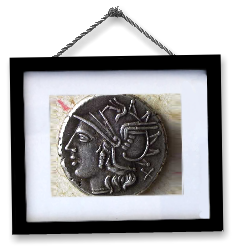ADJECTIVES
For information on adjective prefixes click here.
For information on Roman numerals click here.
Adjectives describe nouns. In Latin, they always match the noun they describe in number, case, and gender. However, they do not necessarily have to be in the same declension. If you don't know what these mean refer to the Nouns section of HudsonLOL before reading ahead.
For example, agricola is first declension (which are usually feminine endings) but it is a male noun. Therefore, the endings added to the adjective that describe agricola are the masculine endings of the second declension: malus agricola or "the bad farmer."
This means that like nouns, Latin adjectives must also be declined (except when you run into indeclinable adjectives which are obviously, well, indeclinable). Latin 1st and 2nd declension adjectives are declined like nouns in the 1st and 2nd declensions. It so happens that like nouns, there are also 3rd declension adjectives, but there are no 4th or 5th declension adjectives. So, since there are more declensions for nouns than adjectives, the number of the declension of the noun cannot possibly have to match the number of the declension of the adjective. It's even misleading to think of adjectives as belonging to the 1st OR the 2nd declension. They belong to both but look different depending on gender. For this reason, it's better to refer to such adjectives as 1st AND 2nd declension adjectives, which are the ones you will be looking at first:
For information on adjective prefixes click here.
For information on Roman numerals click here.
Adjectives describe nouns. In Latin, they always match the noun they describe in number, case, and gender. However, they do not necessarily have to be in the same declension. If you don't know what these mean refer to the Nouns section of HudsonLOL before reading ahead.
For example, agricola is first declension (which are usually feminine endings) but it is a male noun. Therefore, the endings added to the adjective that describe agricola are the masculine endings of the second declension: malus agricola or "the bad farmer."
This means that like nouns, Latin adjectives must also be declined (except when you run into indeclinable adjectives which are obviously, well, indeclinable). Latin 1st and 2nd declension adjectives are declined like nouns in the 1st and 2nd declensions. It so happens that like nouns, there are also 3rd declension adjectives, but there are no 4th or 5th declension adjectives. So, since there are more declensions for nouns than adjectives, the number of the declension of the noun cannot possibly have to match the number of the declension of the adjective. It's even misleading to think of adjectives as belonging to the 1st OR the 2nd declension. They belong to both but look different depending on gender. For this reason, it's better to refer to such adjectives as 1st AND 2nd declension adjectives, which are the ones you will be looking at first:
1st and 2nd Declension Adjectives
| Masculine | Feminine | Neuter | ||||
|---|---|---|---|---|---|---|
| Case | Singular | Plural | Singular | Plural | Singular | Plural |
| Nom | us | i | a | ae | um | a |
| Gen | i | orum | ae | arum | i | orum |
| Dat | o | is | ae | is | o | is |
| Acc | um | os | am | as | um | a |
| Abl | o | is | a | is | o | is |
For that reason, adjectives are usually listed like this:
bonus -a -um
boni -ae -i
bono -ae -o
bonum -am -um
bono -a -o
boni -ae -a
bonorum -arum -orum
bonis -is -is
bonos -as -a
bonis -is -is
...because they can take any of those forms. It all depends on the number, case, and gender of the noun they modify.
3rd Declension Adjectives
Three Termination
| Masculine | Feminine | Neuter | ||||
|---|---|---|---|---|---|---|
| Case | Singular | Plural | Singular | Plural | Singular | Plural |
| Nom | -- | es | -- | es | -- | ia |
| Gen | is | ium | is | ium | is | ium |
| Dat | i | ibus | i | ibus | i | ibus |
| Acc | em | es | em | es | -- | ia |
| Abl | i | ibus | i | ibus | i | ibus |
Two Termination
| Masculine/Feminine | Neuter | |||
|---|---|---|---|---|
| Case | Singular | Plural | Singular | Plural |
| Nom | -- | es | -- | ia |
| Gen | is | ium | is | ium |
| Dat | i | ibus | i | ibus |
| Acc | em | es | -- | ia |
| Abl | i | ibus | i | ibus |
These adjectives are declined like third declension I-stem nouns. Like the neuter I-stems, they always have an i in the ablative singular. The most common adjectives that we have spoken of so far (the first and second declension adjectives) were also classified as "three termination" because they were "us-a-um" so they had three sets of potential endings. Third declension adjectives, however, are a little different in that some of them are three termination, some are two, and some are one. Don't you just love Latin? :)
Third declension adjectives that are three termination end in er in the masculine nominative, is in the feminine, and e in the neuter.
Three termination adjectives (3rd declension)
Third declension adjectives that are two termination end in is in both the masculine and feminine nominative singular and in e in the neuter nominative. Adjectives of two terminations are declined like third terminations except there are no feminine set of endings.
Two termination adjectives
One termination adjectives
(the genitive is given so that you know how to decline it)
Third declension adjectives that are three termination end in er in the masculine nominative, is in the feminine, and e in the neuter.
Three termination adjectives (3rd declension)
- acer, acris, acre - sharp, fierce
- celer, celeris, celere - swift
Third declension adjectives that are two termination end in is in both the masculine and feminine nominative singular and in e in the neuter nominative. Adjectives of two terminations are declined like third terminations except there are no feminine set of endings.
Two termination adjectives
- brevis, breve - short
- facilis, facile - easy
- fortis, forte - brave
- gravis, grave - heavy, severe
- omnis, omne - all, every
- similis, simile - like, similar
One termination adjectives
(the genitive is given so that you know how to decline it)
- audax, audacis-->genitive - daring, boldness
- potens, potentis-->genitive - potent





